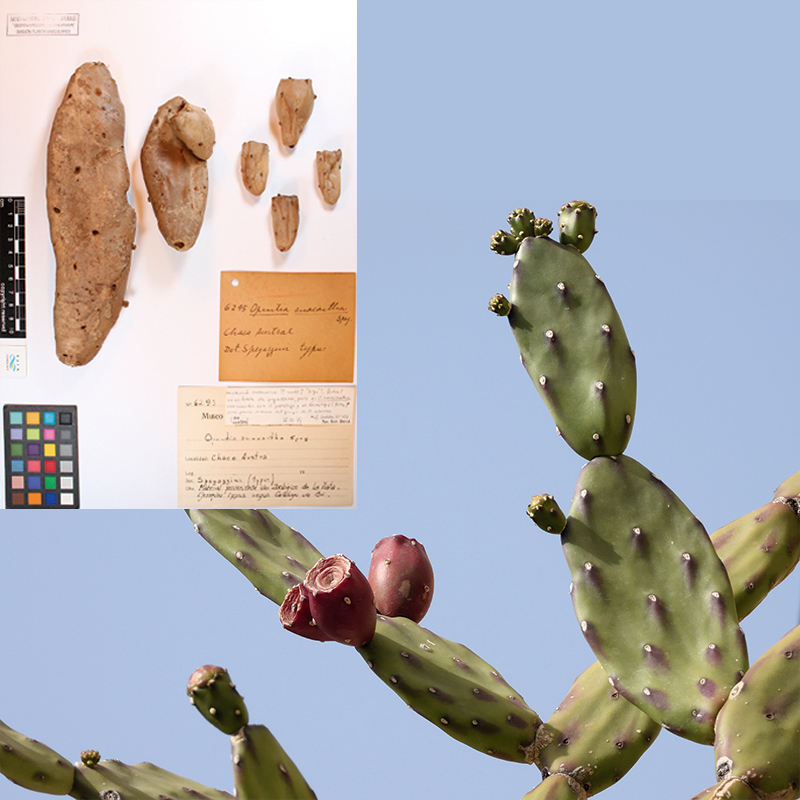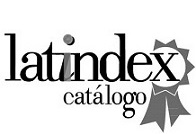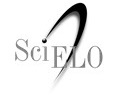Notas nomenclaturales y taxonómicas en el género Opuntia (CactaceaeOpuntioideae) para la Argentina
DOI:
https://doi.org/10.30972/bon.3317342Palabras clave:
lectotipos, neotipos, nomenclatura, Opuntia, EpitiposResumen
En el marco del estudio del género Opuntia (Cactaceae) para la Argentina se analizaron 10 nombres del grupo: Opuntia anacantha, O. bispinosa, O. brunnescens, O. discolor, O. distans, O. hildemannii, O. kiska-loro, O. pampeana, O. sulphurea y O. vulpina.
El objetivo fue la designación de lectotipos, neotipos o epitipos, cuando fuera necesario; así como también resolver problemas de estatus nomenclatural o taxonómicos, para cada uno de los taxones. Se consultaron los protólogos de todos los nombres y ejemplares depositados en herbarios, a través de visitas personales o consulta de imágenes disponibles online. Para las tipificaciones se siguieron las reglas y disposiciones del Código Internacional de Nomenclatura (CIN). Se discute y modifica el estatus de los tipos designados previamente para Opuntia anacantha, O. brunnescens, O. discolor, O. distans y O. kiska-loro. Se designan: un lectotipo para O. hildemannii; neotipos para O. pampeana y O. vulpina; y un epitipo para O. sulphurea. Se explica la razón por la cual el nombre O. bispinosa carece de estatus nomenclatural. Además, se proponen dos nuevos sinónimos y una combinación.
Descargas
Citas
Anderson, E. (2001). The Cactus Family. Timber Press, Portland, Oregon, USA.
Arenas, P. (2003). Etnografía y Alimentación entre los Toba-Ñachilamoleek y Wichí-Lhuku’tas del Chaco Central (Argentina). 1° ed., Buenos Aires.
Backeberg, C. (1958). Die Cactaceae. Handbuch der Kakteenkunde. Vol. 1. G. Fischer Verlag, Jena, Alemania.
Backeberg, C. (1962). Die Cactaceae. Handbuch der Kakteenkunde. Vol. 6. G. Fischer Verlag, Jena, Alemania.
Britton, N. & Rose, N. (1919). The Cactaceae: Descriptions and illustrations of plants of the cactus family. Vol. I. The Carnegie Institution of Washington, Washington.
Castellanos, A. (1957). Revisión de las Cactáceas Argentinas. Revista Facultad Ciencias Agrarias (Mendoza) 6: 1-29.
Catrix, J., Kiesling, R. & Schweich, D. (2020). Frédéric Albert Constantin Weber. Travaux consacrés aux Cactus et Agaves II: Notes de travail –Correspondance diverse– Travaux annexes. https://www.cactuspro.com/biblio/en:catrix#frederic_albert_constantin_weberla_medecine_militaire_la_passion_botanique_ou_la_double_vie_du_dr_w
Crook, R. & Mottram, R. (1995). Opuntia Index, part 1: Introduction and A-E. Bradleya 13: 89-118.
Crook, R. & Mottram, R. (1998). Opuntia Index, part 4: G-H. Bradleya 16: 119-136.
Don, G. (1830). N° 12623 Opuntia sulphurea y N° 12624 Opuntia sericea. En Loudon J. C. (ed.), Hortus Britannicus, pp. 195. A. & R. Spottiswoode, Londres.
Dorr, L. & Nicolson, D. (2008). Taxonomic literature: A selective guide to botanical publications and collections with dates, commentaries and types. Suppl. VII: F-Frer [online], pp. 16-20. A. R. G. Gantner Verlag K. G., Germany. https://www.sil.si.edu/DigitalCollections/tl2/browse.cfm?vol=14#page/7
Fadel, V., Alvarenga, E. & Arriaga, M. (2014). Cactaceae type specimens deposited in the Museo Argentino de Ciencias Naturales (BA Herbarium), Buenos Aires, Argentina. Revista del Museo Argentino de Ciencias Naturales, n. s. 16: 95-105.
Font, F. (2016). Carlos Spegazzini: Icones Cactacearum. Álbum y fotografías de Cactáceas del Dr. Carlos Spegazzini en el Herbario del Museo de Farmacobotánica “Juan A. Domínguez” (BAF), Facultad de Farmacia y Bioquímica, Universidad de Buenos Aires, Buenos Aires, Argentina. Dominguezia 32: 5-9.
Friĉ, A. V. (1927). Der Pflanzenjäger IX. Gymnocalycium (Echinocactus) gibbosum. Möllers Deutsche Gärtner-Zeitung 42: 377.
Guiggi, A. (2012). Reassesment of the infra-specific variability of Opuntia sulphurea Gillies ex Salm-Dyck (Opuntioideae-Opuntieae) from Argentina and Bolivia. Cactology 3: 10-12.
Hunt, D. (2008). NCL addenda, corrigenda and miscellaneous comments: Opuntia. Cactaceae Systematics Initiatives 23: 15-23.
Hunt, D., Taylor, N. & Charles, G. (eds.). (2006). The New Cactus Lexicon. Description and illustrations of the cactus family. DH Publ., UK.
Iliff, J. (2000). New Types in Opuntia sens. lat. Cactaceae Systematics Initiatives 9: 5-7.
Iliff, J. (2002). The Andean opuntias: an annotated checklist of the indigenous non-platyopuntioid opuntias (Cactaceae-Opuntioideae) of South America. En Hunt, D. & N. Taylor (eds.) Studies in the Opuntioideae. Succulent Plant Research 6: 133-244.
Katinas, L., Gutiérrez, D. & Torres Robles, S. (2000). Carlos Spegazzini (1858-1926): Travels and Botanical Work on Vascular Plants. Annals of the Missouri Botanical Garden 87: 183-202.
Katinas, L., Gutiérrez, D. & Torres Robles, S. (2004). Type material of Carlos L. Spegazzini in the Museo de la Plata Herbarium (LP), Argentina. III: Cactaceae. Darwiniana 42: 177-200.
Kiesling, R. (1984a). Recopilación, en edición facsimilar, de todos los trabajos o referencias sobre Cactáceas publicados por el Dr. Carlos Spegazzini. Librosur ediciones, Quilmes, Argentina.
Kiesling, R. (1984b). Estudios en Cactaceae de Argentina: Maihueniopsis, Tephrocactus y géneros afines (Opuntioideae). Darwiniana 25: 171-215.
Kiesling, R. (1986). Tipos de Cactáceas Sudamericanas en herbarios extranjeros. Boletín de la Sociedad Argentina de Botánica 24: 381-386.
Kiesling, R. (1998). Nota sobre Opuntia anacantha Speg. (Cactaceae) para la flora de Paraguay y Argentina. Candollea 53: 471-476.
Kiesling, R. & Meglioli, S. (2003). Cactaceae. En Kiesling, R. (ed.), Flora de San Juan. Vol. II, pp. 161-193. Estudio Sigma, Buenos Aires.
Kiesling, R. & Ferrari, O. (2005). 100 Cactus Argentinos. Ed. Albatros, Buenos Aires.
Kiesling, R., Larocca, J., Faúndez, I., Metzing, D. & Albesiano, S. (2008). Cactaceae. En Zuloaga, F. O., O. Morrone & M. Belgrano (eds.), Catálogo de las Plantas Vasculares del Cono Sur (Argentina, Sur de Brasil, Chile, Paraguay y Uruguay), Vol. 2: Dicotyledoneae: Acanthaceae-Fabaceae (Abarema-Schizolobium). Monographs in Systematic Botany from the Missouri Botanical Garden 107: 1715-1830.
Kiesling, R. & Schweich, D. (2020). Some old Documents about Argentinian Cacti. Cactus and Succulent Digital Library [online]. https://www.cactuspro.com/biblio/en:kiesling_dsw#some_old_documents_about_argentinian_cacti
Köhler, M., Oakley, L. J., Font, F., Las Peñas, M. L. & Majure, L. (2021). On the continuum of evolution: a putative new hybrid speciation event in Opuntia (Cactaceae) between a native and an introduced species in southern South America. Systematics and Biodiversity 19: 1026-1039. https://dx.doi.org/10.1080/14772000.2021.1967510
Korotkova, N., Aquino, D., Arias, S., Eggli, U., Franck, A., Gómez-Hinostrosa, C., Guerrero, P., Hernández, H., Kohlbecker, A., Köhler, M., Luther, K., Majure, L., Müller, A., Metzing, D., Nyffeler, R., Sánchez, D. Schlumpberger, B. & Berendsohn, W. (2021). Cactaceae at Caryophyllales.org-a dynamic online species-level taxonomic backbone for the family. Willdenowia 51: 251-270. https://doi.org/10.3372/wi.51.51208
Majure, L., Puente, R., Griffith, M., Judd, W., Soltis, P. & Soltis, D. (2012). Phylogeny of Opuntia s.s. (Cactaceae): Clade delineation, geographic origins, and reticulate evolution. American Journal of Botany 99: 847-864. https://doi.org/10.3732/ajb.1100375
Oakley, L. J. (2019). Análisis de la variabilidad infraespecífica y de distribución de Opuntia anacantha Speg. (Cactaceae-Opuntioideae) en la Región Chaqueña Argentina. Tesis de Maestría en Manejo y Conservación de Recursos Naturales Facultad de Ciencias Agrarias-Universidad Nacional de Rosario. 222 pp.
Perea, M. (2007). Relevamiento de Cactáceas en la Provincia de Catamarca. Colección Flora y Fauna de la Provincia de Catamarca, Consejo Federal de Inversiones, Buenos Aires.
Ritter, F. (1980). Kakteen in Südamerika. Band 2. Argentinien/Bolivien. F. Ritter, Spangenberg, Alemania.
Roland-Gosselin, M. R. (1904). OEuvres posthumes de M. le Dr. Weber, Médecin inspecteur de L’Armée. Bulletin du Muséum d’Histoire Naturelle (París) 10: 382-399.
Salm-Dyck, J. F. M. A. H. (1834). Hortus Dyckensis. Chez Arnz & Comp. Dusseldorf, Alemania.
Schumann, K. (1898). Gesamtbeschreibung der Kakteen (Monographia Cactacearum), Lieferung 11 und 12, pp. 641-678. Verlag von J. Neumann, Neudamm, Alemania.
Smith, J. G. (1901). Seed and Plants, imported for distribution in cooperation with the agricultural experiment stations: Inventory N° 8. Nº 3401-4350. Ed. USDA. https://www.ars.usda.gov/northeast-area/beltsville-md-barc/beltsville-agricultural-research-center/national-germplasm-resources-laboratory/docs/plant-inventory-books/
Spegazzini, C. (1896). Contribución al estudio de la Flora de la Sierra de la Ventana. Ministerio de Obras Públicas de la Provincia de Buenos Aires. La Plata.
Spegazzini, C. (1900). Notas Botánicas. Anales de la Sociedad Científica Argentina 49: 122-125.
Spegazzini, C. (1905). Cactacearum platensium tentamen. Anales Museo Nacional Buenos Aires 11: 476-521.
Stafleu, F. & Cowan, R. (eds.). (1985). Taxonomic literature: A selective guide to botanical publications and collections with dates, commentaries and types, 2 ed., vol. V, Salt-Ste [online], pp. 776-785. Bohn, Scheltema & Holkema, Utrech/Antwerpen, Netherlands. https://www.sil.si.edu/DigitalCollections/tl-2/browse.cfm?vol=5#page/11
Stafleu, F. & Mennega, E. (eds.). (1993). Taxonomic literature: A selective guide to botanical publications and collections with dates, commentaries and types. Ed. 2, Suppl. II, Be-Bo [online], pp. 276-279. Koeltz Scientific Books D-61453 Königstein, Germany. https://www.sil.si.edu/DigitalCollections/tl-2/browse.cfm?vol=9#page/7
Stuppy, W. (2002). Seed characters and the classification of the Opuntioideae. En Hunt, D. & N. Taylor (eds.) Studies in the Opuntioideae. Succulent Plant Research 6: 25-58.
Taylor, N. (2007). Cactaceae of Bolivia: additional departmental records. Cactaceae Systematics Initiatives 22: 10-11.
Taylor, N. (2008). Notes on Opuntia from the Rio Grande basin, Bolivia. Cactaceae Systematics Initiatives 23: 23-28.
Thiers, B. (2023). Index Herbariorum: A Global Directory of Public Herbaria and Associated Staff. [online]. New York Botanical Garden’s Virtual Herbarium. http://sweetgum.nybg.org/science/ih/ (Consulta 06/2023]
Todd, A. (2009). Biographies of the agricultural explorers of the USDA’s Bureau of Plant Industry 1897-1955, Part 1, A-F. Huntia 14: 51-86.
Trevisson, M. & Demaio, P. (2006). Cactus de Córdoba y el centro de Argentina. 1º ed. L.O.L.A, Literature of Latin America, Buenos Aires.
Trevisson, M. & Perea, M. (2016). Cactus del Oeste de Argentina. 2º ed. L.O.L.A, Buenos Aires.
Turland, N., Wiersema, J., Barrie, F., Greuter, W., Hawksworth, D., Herendeen, P., Knapp, S., Kusber, W. -H., Li, D. -Z., Marhold, K., May, T., McNeill, J., Monro, A., Prado, J., Price, M. & Smith, G. (eds.). (2018). International Code of Nomenclature for algae, fungi, and plants (Shenzhen Code) adopted by the Nineteenth International Botanical Congress Shenzhen, China, July 2017. Regnum Vegetabile 159 [online]. Glashütten: Koeltz Botanical Books. https://www.iapt-taxon.org/nomen/main.php (Consulta 06/2023)
Weber, F. A. C. (1898). Opuntia. En Bois, D. G. (ed.), Dictionnaire d’Horticulture Vol. 2, pp. 892-899. Librairie des Sciences Naturelles, P. Klincksieck, París.

Descargas
Publicado
Versiones
- 2024-02-22 (4)
- 2024-02-09 (3)
- 2024-02-09 (2)
- 2024-02-09 (1)
Cómo citar
Número
Sección
Licencia
Derechos de autor 2024 Bonplandia

Esta obra está bajo una licencia internacional Creative Commons Atribución 4.0.
Declaration of Adhesion to Open Access
- All contents of Bonplandia journal are available online, open to all and for free, before they are printed.
Copyright Notice
- Bonplandia magazine allows authors to retain their copyright without restrictions.
- The journal is under a Creative Commons Attribution 4.0 International license.














.jpg)


